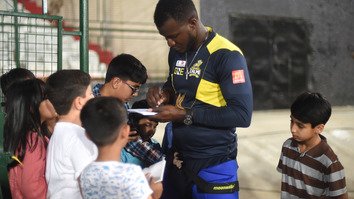KHAR, Bajaur District -- A Khyber Pakhtunkhwa-based (KP) social welfare group seeking to educate tribal youth about the perils of radicalisation and extremism has received a grant from a US-funded peace organisation.
The US Institute of Peace (USIP), which aims to help local partners prevent, mitigate and resolve violent conflicts worldwide, awarded a grant to the Khadim Ul Khalaq Foundation (KKF) for its "Promoting Peace through Critical Thinking" project, the USIP said in a statement on October 22.
KKF was among other grant winners of the USIP's first Youth and Peacebuilding Grants Competition, which was held among the worldwide members of its Generation Change Fellows Programme.
The competition's goal is to increase the numbers and the scale of critical peace-building initiatives that are led by, and focused on, youth, said the USIP in a statement.
![A participant shows her drawing for "Climate Action for Peace" on the International Day of Peace on September 21 at Khyber Public School and College Bara in the Khyber tribal district. [Hanif Ullah]](/cnmi_pf/images/2019/11/25/21026-usip2-585_329.jpg)
A participant shows her drawing for "Climate Action for Peace" on the International Day of Peace on September 21 at Khyber Public School and College Bara in the Khyber tribal district. [Hanif Ullah]
![Participants take part in the July 31, 2016, 'Pluralism and Co-existence' conference in Peshawar organised by KKF. [Hanif Ullah]](/cnmi_pf/images/2019/11/25/21027-18-585_329.jpg)
Participants take part in the July 31, 2016, 'Pluralism and Co-existence' conference in Peshawar organised by KKF. [Hanif Ullah]
KKF was founded in Khyber District by young civic leaders in 2012 in response to the rise of extremism and the Taliban in the region.
"Through the energies of hundreds of volunteer members," KKF "works to integrate peace education into Pakistan's national education curriculum", the USIP said.
"USIP's grant funds a programme to achieve that integration in Khyber District, a strategic area on the Afghan border where extremist organisations recruit youth as members. The curriculum will increase critical thinking skills among youth and thus reduce the effectiveness of violent narratives that such groups use for recruitment," it added.
KKF is filling an educational void for vulnerable youth, said KKF Chairman Muhammad Farooq Afridi.
"A decade-long war on terror in tribal areas of Pakistan has proved that our educational institutions are providing limited education, very little or no emphasis on contemporary education, and no building of critical thinking skills," he said on November 19.
In addition, education has lacked "dialogues on conflict resolution and confidence building, little freedom of expression and no teachings about pluralism and co-existence", he added. "This leaves students vulnerable to extremist and radical narratives."
"To achieve peace, prepare our young people to critically think, polish their confidence and educate them about peace education, we need to introduce extensive and inclusive training programmes that can fill this void," Afridi said.
The initiative aims to enable high-school students to be able to counter radical narratives through critical thinking and peace education, he said. The KKF will teach a one-week course for eighth, ninth and 10th graders under the project.
The initiative has the support of the Bajaur District Education Office. KKF will be closely working with the education office in implementing the project, Afridi said, adding that it will train 30 young students from 10 different schools.
Female students will make up 30% of the total target group in Khyber District, he said.
Peace-promoting events
KKF regularly hosts events to emphasise the need for peace.
In September, it organised a drawing competition titled "Climate Action for Peace" on the 2019 International Day of Peace at Khyber Public School and College Bara in Khyber District.
About 20 schoolchildren participated in the drawing competition in which they created sketches about peace and climate action.
"The purpose of the event was to highlight the importance of peace and to defy conflict/violence in the region. Here in our area, residents suffered greatly because of violent extremism, and we want to counter the radical narrative by engaging our youth in peace initiatives," said KKF General Secretary Ahmad Shah.
"Our youth have the potential to contribute in the process of peace and development if they are given a proper platform," said Asghar Khan, the principal of Khyber Public School and College Bara.
The KKF also organised a conference on "Pluralism and Co-existence" for the youth and elders of the former Federally Administered Tribal Areas (FATA) in July 2016. Members of the Christian, Muslim, Hindu and Sikh communities participated in that gathering in Peshawar.
The world is a global village where everyone is dependent on each other and where it is impossible for a religious group to live in isolation, KKF Chairman Afridi said.
"We are trying to form a better society in conflict-affected areas," he added. "We want unity and a society where everyone can feel free and share his [or her] views and thoughts," he said.

![Students work on drawings as part of the "Climate Action for Peace" competition on the International Day of Peace on September 21. It was organised by the Khadim Ul Khalaq Foundation at Khyber Public School and College Bara. [Hanif Ullah]](/cnmi_pf/images/2019/11/25/21025-usip1-585_329.jpg)







Good
Reply2 Comment(s)
Join pak army
Reply2 Comment(s)